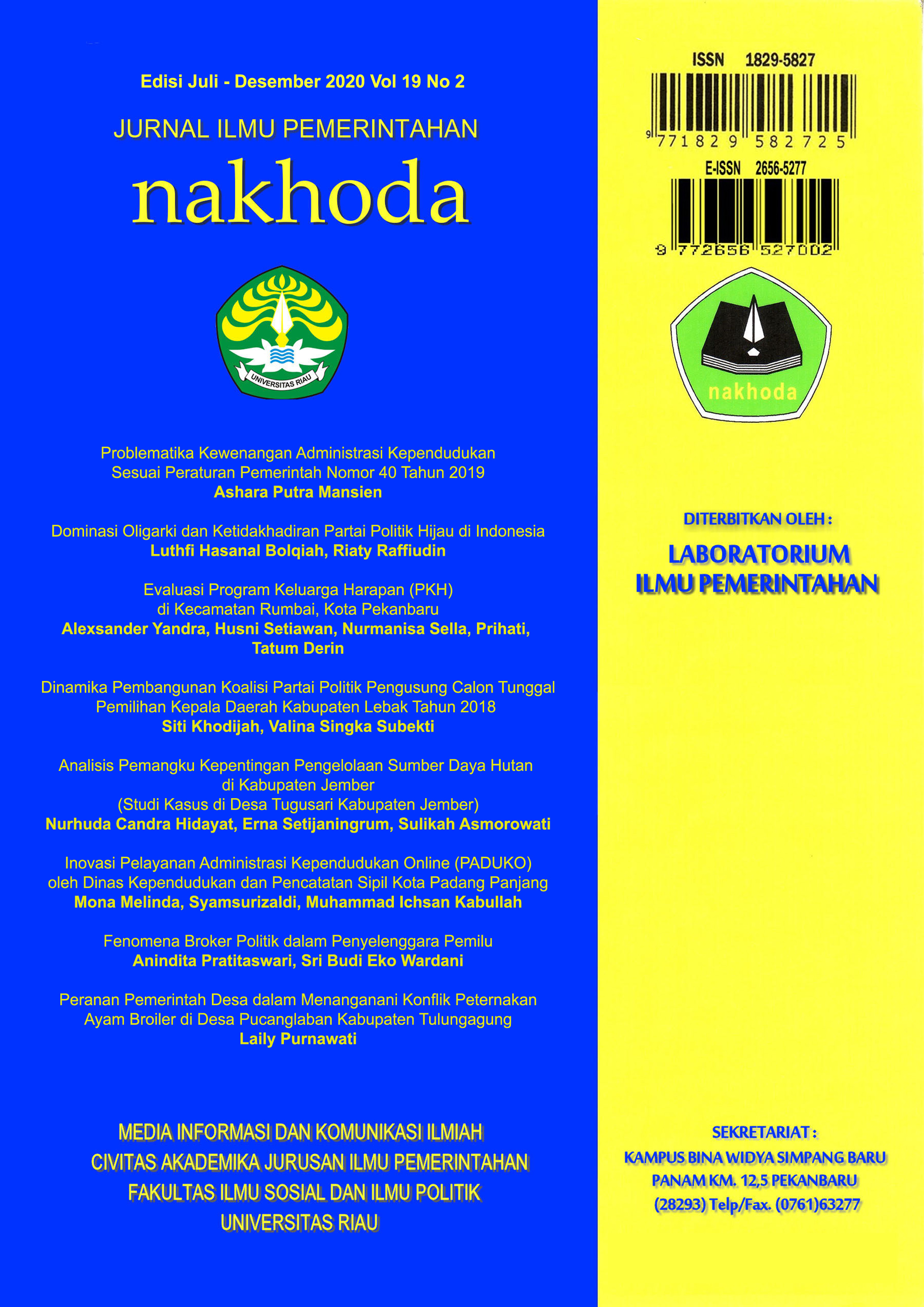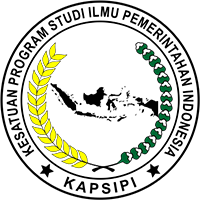Dominasi Oligarki dan Ketidakhadiran Partai Politik Hijau di Indonesia
DOI:
https://doi.org/10.35967/njip.v19i2.112Kata Kunci:
Kerusakan Lingkungan, Politik Hijau, Dominasi Oligarki, Partai Politik, PerwakilanAbstrak
Kerusakan lingkungan dan dampaknya merupakan persoalan yang masih terus berlanjut di Indonesia serta belum cukup mampu untuk mendorong transformasi narasi politik hijau menjadi platform partai politik sebagaimana yang terjadi di negara lain. Literatur sebelumnya seringkali menggunakan kerangka liberalis dan menuntut kesadaran kolektif serta partisipasi masyarakat dalam mengawasi persoalan lingkungan, bukan urgensi keterwakilan politik hijau. Selain itu, perspektif konstitusional dan institusional juga terlampau idealis dan kurang memperhatikan kepentingan individu yang selalu mencari keuntungan. Tulisan ini berupaya untuk menganalisa penyebab dari persoalan lingkungan serta absennya keterwakilan narasi politik hijau dalam bentuk formal dengan menggunakan teori oligarki dan keterwakilan politik. Melalui analisa kualitatif deskriptif dengan metode wawancara dan studi literatur ditemukan: (1) narasi politik Hijau di Indonesia tersebar di berbagai janji kandidat dan partai politik menjelang pemilu, (2) konsentrasi pengelolaan dan penguasaan sumber daya alam merupakan sumber pendapatan oligark yang terus dipertahankan, (3) keterlibatan oligark dalam politik menghambat pertimbangan narasi politik hijau dalam proses pembuatan kebijakan, (4) ketidakhadiran platform partai politik hijau memberi keleluasaan terhadap dominasi oligark, sedangkan (4) konsolidasi platform politik hijau juga terkendala faktor internal berupa pro dan kontra pendirian partai serta faktor eksternal seperti sistem kepartaian dan aturan-aturan pemilihan umum.
Unduhan
Referensi
Arifin, Z. (2012). Politik Ekologi: Ramah Lingkungan Sebagai Pembenaran. Jurnal Ilmu Sosial Mamangan, 1(1), 11–16. https://doi.org/https://doi.org/10.22202/mamangan.88
Arnesen, S., & Peters, Y. (2018). The Legitimacy of Representation: How Descriptive, Formal, and Responsiveness Representation Affect the Acceptability of Political Decisions. Comparative Political Studies. https://doi.org/10.1177/0010414017720702
Aspinall, E. (2014). Popular agency and interests in Indonesia’s democratic transition and consolidation. In M. Ford & T. B. Pepinsky (Eds.), Beyond Oligarchy: Wealth, Power, and Contemporary Indonesian Politics (pp. 117–13). Cornell Southeast Asia Program Publications. https://doi.org/10.5728/indonesia.96.0011
Aspinall, E., & Barenschot, W. (2019). Democracy For Sale: Pemilihan Umum, Klientelisme dan Negara di Indonesia. Yayasan Pustaka Obor.
Azhar, M. A. (2007). Kerusakan Ekologis Hutan Jati di Kabupaten Muna (Potret Pemujaan Pendekatan Anthroposentris). Jurnal Ilmu Sosial Dan Ilmu Politik, 11(2), 153–286. https://doi.org/https://doi.org/10.22146/jsp.10998
Bachtiar, Bolqiah, L. H., & Andrean, S. (2020). Menguatnya Partai Politik Kartel Pada Pemilu Serentak 2019. Jurnal Pengawasan Pemilu Provinsi DKI Jakarta, 73–92. ISSN: 2541-2078
Bayu, D. D. (2019). KPA: 364 Orang Jadi Korban Konflik Agraria Selama 2018. Katadata. https://katadata.co.id/hariwidowati/berita/5e9a5577d2e10/kpa-364-orang-jadi-korban-konflik-agraria-selama-2018
Botetzagias, I., & van Schuur, W. (2012). Active Greens: An Analysis of the Determinants of Green Party Members’ Activism in Environmental Movements. Environment and Behavior, 44(4), 509–544. https://doi.org/10.1177/0013916510393278
Bowman, J. S. (1978). Ecology and the Politics of Scarcity: Prologue to a Political Theory of the Steady State. William Ophuls. The Journal of Politics, 40(1), 249–250. https://doi.org/10.2307/2129995
Bryner, G. C. (2001). ABSTRACT: The Idea of Sustainability and its Implications for Energy Law and Policy. AAPG Bulletin, 85. https://doi.org/10.1306/61eed9a4-173e-11d7-8645000102c1865d
CNN Indonesia. (2018). Total 326 Orang Jadi Tersangka Korupsi SDA Selama 2010-2017. https://www.cnnindonesia.com/nasional/20180427144107-20-294128/total-326-orang-jadi-tersangka-korupsi-sda-selama-2010-2017
Dalton, R. J., Recchia, S., & Rohrschneider, R. (2003). The environmental movement and the modes of political action. Comparative Political Studies, 36(7), 743–771. https://doi.org/10.1177/0010414003255108
Dethier, J. J. (2017). Trash, cities, and politics: Urban environmental problems in Indonesia. Southeast Asia Program Publications, 103, 73–90. https://doi.org/10.5728/indonesia.103.0073
Duverger, M., & Duverger, M. (1972). The Forms of Political Conflict. In The Study of Politics. https://doi.org/10.1007/978-94-009-3171-8_6
Dwi, D. (2018). Jakarta dan Bandung dua kota dengan kualitas udara terburuk di Asia Tenggara. Antara Megapolitan. https://megapolitan.antaranews.com/berita/36759/jakarta-dan-bandung-dua-kota-dengan-kualitas-udara-terburuk-di-asia-tenggara
Gahrton, P. (2015). Introduction?: The Greens – Towards Hegemony in the Anthropocene. In P. Gahrton & C. Lucas (Eds.), Green Parties, Green Future: From Local Groups to the International Stage. Pluto Press. http://www.jstor.org/stable/j.ctt183p8rr.6
García, J. H., Sterner, T., & Afsah, S. (2007). Public disclosure of industrial pollution: The PROPER approach for Indonesia? Environment and Development Economics, 12(6), 739–756. https://doi.org/10.1017/S1355770X07003920
Greenpeace Indonesia. (2019). Ganti Rugi 18,9 Triliun Terkait Kasus Kebakaran dan Kerusakan Hutan Gagal Dibayar Sejumlah Perusahaan, Pemerintah Harus Mengambil Langkah Tegas. Siaran Pers Greenpeace. https://www.greenpeace.org/indonesia/siaran-pers/1103/ganti-rugi-189-triliun-terkait-kasus-kebakaran-dan-kerusakan-hutan-gagal-dibayar-sejumlah-perusahaan-pemerintah-harus-mengambil-langkah-tegas/
Hadiz, V. R., & Robison, R. (2013). The political economy of oligarchy and the reorganization of power in Indonesia. Indonesia. https://doi.org/10.5728/indonesia.96.0033
Hardin, G. (1968). The tragedy of the commons. Science, 162, 1243–1248. https://doi.org/10.1126/science.162.3859.1243
Hartati, A. Y. (2007). Lingkungan Hidup dan Liberalisasi Perdagangan: Upaya Mencari Jalan Tengah. Jurnal Ilmu Sosial Dan Ilmu Politik, 11(2), 193–208. https://doi.org/https://doi.org/10.22146/jsp.10996
Hikmat, I., Durohman, I., & Bhawono, A. (2016). Kisah “Perjanjian Preman” Ahok. Detik. https://news.detik.com/x/detail/investigasi/20160530/Deal-Reklamasi-di-Pulau-Hengky/
Jingga, S. R., & Lestari, A. F. (2019). Oligarki Hambat Perlindungan Lingkungan. Harian Nasional. http://www.harnas.co/2019/10/25/oligarki-hambat-perlindungan-lingkungan
Kasmiruddin. (2018). 102 Juta Kendaraan Ikut Cemari Udara, Polygon Galakkan Bersepeda Mendukung Environment Indonesia Menjadi Lebih Baik. Babel Review. https://babelreview.co.id/102-juta-kendaraan-ikut-cemari-udara-polygon-galakkan-bersepeda-mendukung-environment-indonesia-menjadi-lebih-baik
Katz, R. S., & Mair, P. (1995). Changing models of party organization and party democracy: The Emergence of the Cartel Party. Party Politics, 1(1), 5–28. https://doi.org/10.1177/1354068895001001001
Katz, R. S., & Mair, P. (2009). The cartel party thesis: A restatement. Perspectives on Politics, 7(4), 753–766. https://doi.org/10.1017/S1537592709991782
Khotami. (2020). Institutional Building Dalam Mengatasi Persoalan Pertambangan Emas Tanpa Izin Di Kabupaten Kuantan Singingi Provinsi Riau. Nakhoda: Jurnal Ilmu Pemerintahan, 19(1), 17–37. https://doi.org/10.35967/jipn.v19i1.7842
Kompas. (2016). Setiap Tahun, Hutan Indonesia Hilang 684.000 Hektar. Kompas. https://regional.kompas.com/read/2016/08/30/15362721/setiap.tahun.hutan.indonesia.hilang.684.000.hektar
KPK RI. (2019). Nota Sintesis?: Evaluasi Gerakan Nasional Penyelamatan Sumber Daya Alam 2018. https://www.kpk.go.id/images/pdf/LITBANG/Nota-Sintesis-Evaluasi-GNPSDA-KPK-2018-Final.pdf
Kusno, A. (2011). The green governmentality in an Indonesian metropolis. Singapore Journal of Tropical Geography, 32(3), 314–331. https://doi.org/10.1111/j.1467-9493.2011.00440.x
Lay, C. (2007). Nilai Strategis Isu Lingkungan dalam Politik Indonesia. Jurnal Ilmu Sosial Dan Ilmu Politik, 11(2), 153–286. https://doi.org/https://doi.org/10.22146/jsp.10994
Ma’mun, A. R., & Kosandi, M. (2020). The Politics of Campaign Funding in The Presidential Election 2019. Literatus, 2(2), 162–180. https://doi.org/https://doi.org/10.37010/lit.v2i2.93
Mast, J. (2013). Politik Lingkungan Internasional. In J. T. Ishiyama & M. Breuning (Eds.), Ilmu Politik dalam Paradigma Abad ke-21 (1st ed.). PT Kharisma Putra Utama.
Mietzner, M. (2014). Oligarchs, Politicians, and Activists: Contesting Party Politics in Post-Suharto Indonesia. In Beyond Oligarchy: Wealth, Power and Contemporary Indonesian Politics (pp. 99–116). Cornel Southeast Asia Program Publications. https://doi.org/10.7591/9781501719158-008
Muhammad, J., & Abraham, D. (2016). Lengan Politik Masyarakat Sipil: Pengalaman. Harian Indoprogress. https://indoprogress.com/2016/10/lengan-politik-masyarakat-sipil-pengalaman-dan-ikhtiar-partai-hijau-indonesia/
Mutia, E. F., & Asteria, D. (2018). Jakarta Bay reclamation policy: An analysis of political ecology. E3S Web of Conferences. https://doi.org/10.1051/e3sconf/20185200014
Naess, A. (1973). The Shallow and the Deep, Long-Range Ecology Movement: A Summary. Inquiry (United Kingdom), 16(1–4), 95–100. https://doi.org/10.1080/00201747308601682
Nomura, K. (2007). Democratisation and environmental non-governmental organisations in Indonesia. Journal of Contemporary Asia, 37(4), 495–517. https://doi.org/10.1080/00472330701546566
Nooteboom, G., & De Jong, E. B. P. (2010). Against “Green Development Fantasies”: Resource degradation and the lack of community resistance in the Middle Mahakam Wetlands, East Kalimantan, Indonesia. Asian Journal of Social Science, 38(2), 258–278. https://doi.org/10.1163/156853110X490935
Pratiwi, O. C. (2007). Banjir Jakarta 2007: Kegagalan Kolektif Pengelolaan Bumi. Jurnal Ilmu Sosial Dan Ilmu Politik, 11(2), 153–286. https://doi.org/10.22146/jsp.10999
Pulido, L., & Merchant, C. (1993). Radical Ecology: The Search for a Livable World. Economic Geography, 69(4), 445. https://doi.org/10.2307/143605
Qodriyatun, S. N. (2008). Isu Lingkungan dalam Pilkada13-18. Info Singkat Pusat Penelitian Badan Keahlian DPR RI, 4(2), 13–18. https://berkas.dpr.go.id/puslit/files/info_singkat/Info Singkat-X-2-II-P3DI-Januari-2018-189.pdf
Robison, R., & Hadiz, V. R. (2004). Theories of Change and The Case of Indonesia. In Reorganising Power in Indonesia: The Politics of Oligarchy in an Age of Markets (pp. 18–39). Routledge. https://doi.org/10.4324/9780203401453_chapter_1
Shohibuddin, M. (2016). Peluang dan Tantangan Undang-undang Desa dalam Upaya Demokratisasi Tata Kelola Sumber Daya Alam Desa: Perspektif Agraria Kritis. Masyarakat: Jurnal Sosiologi, 21(1), 1–33. https://doi.org/10.7454/mjs.v21i1.5021
Siombo, M. R. (2014). Tanggung Jawab Pemda Terhadap Kerusakan Lingkungan Hidup Kaitannya Dengan Kewenangan Perizinan Di Bidang Kehutanan Dan Pertambangan. Jurnal Dinamika Hukum, 14(3), 394–405. https://doi.org/10.20884/1.jdh.2014.14.3.306
Sugiarto, N. K. (2018). Bisnis Militer Pasca Orde Baru. CosmoGov, 4(2), 237–246. https://doi.org/10.24198/cosmogov.v4i2.17064
Susanti, N., & Afrizal, A. (2018). Upaya Greeanpeace Menjaga Kawasan Pantai Indonesia Terkait Proyek Pulau Reklamasi Teluk Jakarta. Jurnal Online Mahasiswa Fakultas Ilmu Sosial Dan Ilmu Politik Universitas Riau, 5(1), 1–18. ISSN: 2355-6919.
Swainson, L., & Mahanty, S. (2018). Green economy meets political economy: Lessons from the “Aceh Green” initiative, Indonesia. Global Environmental Change, 53, 286–295. https://doi.org/10.1016/j.gloenvcha.2018.10.009
Syarif, M. L., & Faisal. (2019). Addressing the Root of Political Corruption in Indonesia. Jurnal Antikorupsi Integritas, 5(2), 191–198. https://doi.org/https://doi.org/10.32697/integritas.v5i2.487
Tolo, E. Y. S. (2014). Public Participation in the Implementation of Forestry Decentralization in Indonesia. Bisnis & Birokrasi Journal, 20(2), 113–120. https://doi.org/10.20476/jbb.v20i2.3065
Transparency International. (2013). Corruption Perceptions Index 2013 – Results. Transparency.Org.
VOA Indonesia. (2019). Partai Hijau di Jerman, Perancis, Inggris Rayakan Perolehan Besar dalam Pemilu Eropa. VOA Indonesia. https://www.voaindonesia.com/a/partai-hijau-di-jerman-perancis-inggris-rayakan-perolehan-besar-dalam-pemilu-eropa/4934167.html
Wapner, P. (1995). Politics beyond the state Environmental Activism and World Civic Politics. World Politics, 47(3), 311–340. https://doi.org/10.1017/S0043887100016415
Widjojanto, B. (2017). Masa Depan Indonesia dikorupsi: Tantangan Pengelolaan Sumber Daya Alam. In Penguasaan Sumber Daya Alam dalam Cengkraman Oligarki dan Rezim Neoliberal (11th ed., pp. 8–45). Intrans Institute.
Winarno, H. H. (2016). Adhie Massardi: Ahok kongkalikong dengan pengembang tumbangkan Rizal. https://www.merdeka.com/peristiwa/adhie-massardi-ahok-kongkalikong-dengan-pengembang-tumbangkan-rizal.html
Winters, J. A. (2011). Oligarchy. Cambridge University Press. https://doi.org/10.1017/CBO9780511793806
Yenrizal, & Izomiddin. (2017). Strategi Komunikasi Politik Berbasis Isu Lingkungan Pada Pemilihan Umum Kepala Daerah Palembang 2018. Pelaksanaan Pilkada Serentak Yang Sehat, Jujur, Adil Dan Akuntabel, 1–19. http://repository.umrah.ac.id/74/1/strategi komunikasi politik berbasis isu lingkungan pada pemilihan umum kepala daerah palembang 2018.pdf
Yusri, A., & Adlin. (2017). Organisasi Masyarakat Sipil Membela Masyarakat Dalam Kasus Kabut Asap Di Pekanbaru Tahun 2014. Jurnal Ilmu Pemerintahan Nakhoda, 16(28), 17–37. https://doi.org/10.35967/jipn.v16i28.5820
Zainuddin, M., & Suryaningsih. (2017). Rekalkulasi Transformasi Kelompok Penekan Menjadi Partai Politik: Kajian Pada Hizbut Tahrir Indonesia. Jurnal Ilmu Pemerintahan Nakhoda, 16(28), 1–6. https://doi.org/10.35967/jipn.v16i28.5828
Unduhan
Diterbitkan
Cara Mengutip
Terbitan
Bagian
Lisensi
Hak Cipta (c) 2020 Author(s)

Artikel ini berlisensiCreative Commons Attribution-NonCommercial-ShareAlike 4.0 International License.





